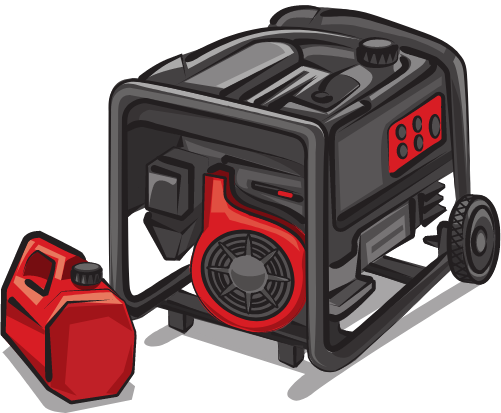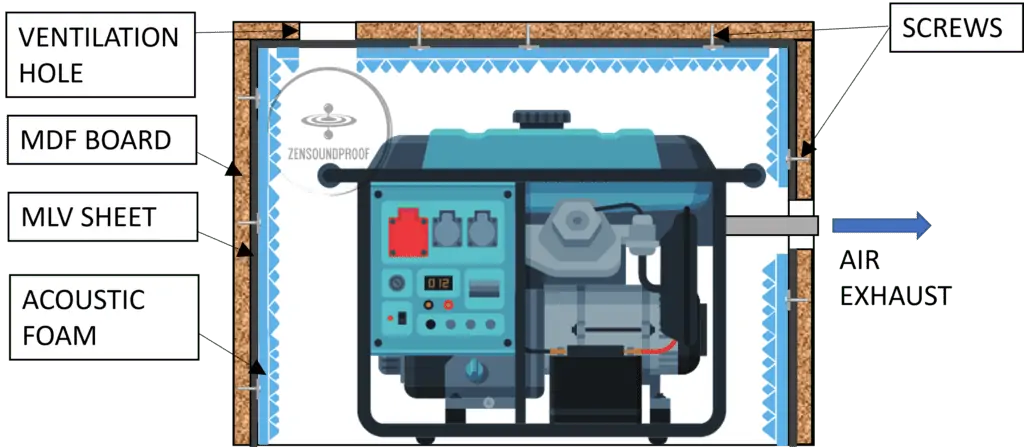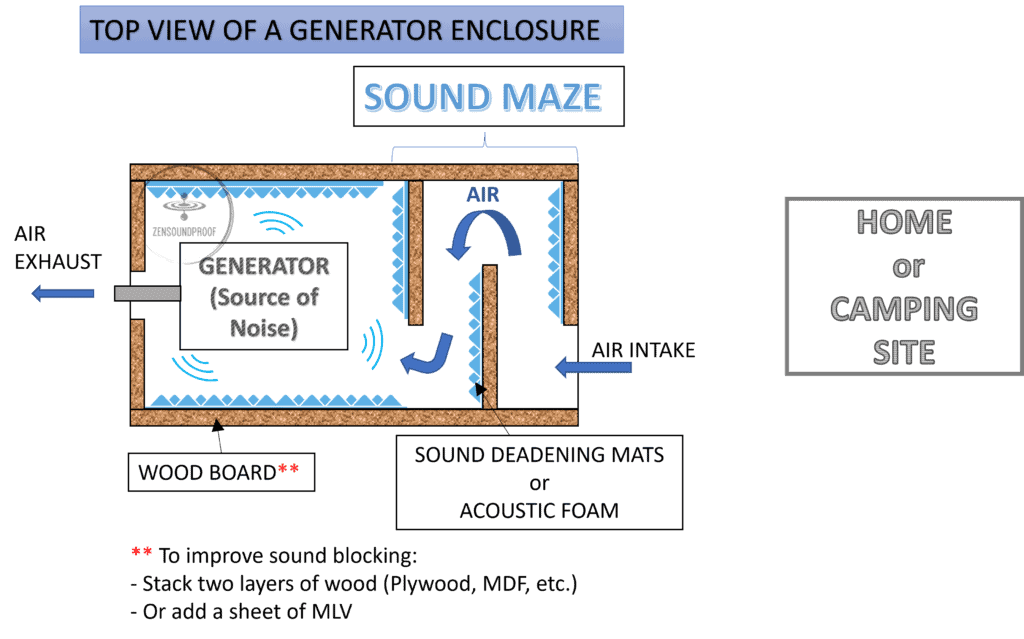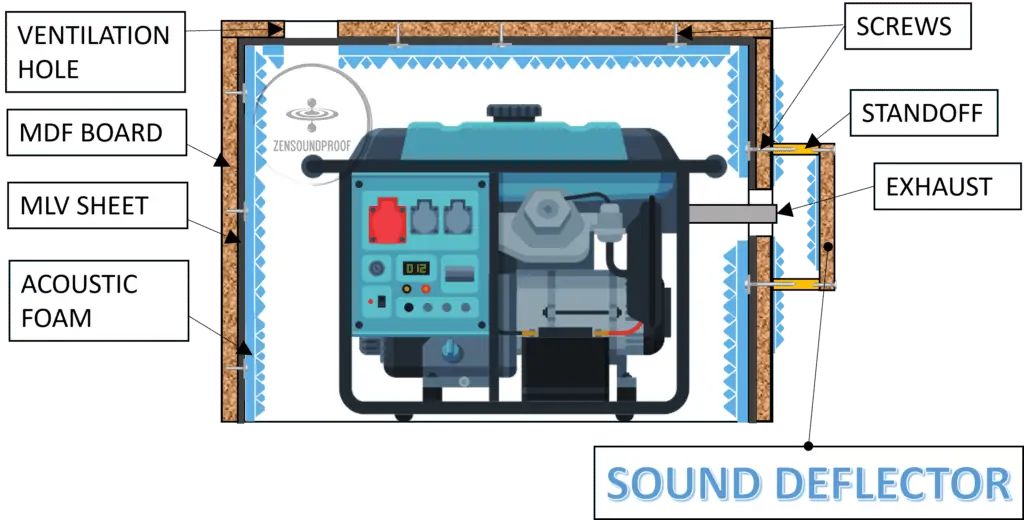If you’ve ever run a loud generator, you’ve probably wished for ways to reduce the noise. Luckily, there are numerous options for how to make your generator quiet as a cricket, providing you’re willing to do some DIY.
And that’s exactly what I cover in this article. We’ll look at 10 solutions for how to make a generator quiet. First, though, let’s look at what makes a generator so loud.
If you’re in a rush, here are my 10 tips for how to make a generator quiet:
- Buy a new muffler
- Use rubber feet
- Build a soundproof generator box
- Install sound deflectors
- Redirect the exhaust away from you
- Move your generator far away
- Make a DIY muffler
- Put your generator in an outhouse
- Make a water muffler
- Buy a new generator
Why are Generators Loud?
Generators are loud because, at the most basic level, they’re engines. All motorized devices emit noise as a byproduct of producing energy, and a generator is no different. Generators feature combustion engines and moving parts, all of which produce sound.

Typically, generators use petrol engines to convert mechanical energy into electrical energy. Modern ones work on the principle of electromagnetic induction and either supply power directly or charge a battery.
When looking at generator noise sources, the 2 most important are the engine and exhaust.
Engine
The generator’s engine is its source of mechanical energy. It uses fuel (e.g. gasoline) to power pistons, which connect to the alternator. We don’t need to get into much more detail about the intricate workings of a generator engine, though.
What matters to us is the type of sound a generator engine produces. It’s impact sound, as the generator’s waste energy is kinetic (vibrations). These vibrations pass through the generator into surrounding structures, through its feet into the floor.
Exhaust
The generator’s exhaust is mainly used to emit waste gas, but it also emits sound. These sounds come from gas inside the engine, which is under high pressure. When it escapes through the exhaust, it can sound like popping or sputtering.
While the engine creates impact sound, the generator’s exhaust produces airborne sound. You can read more about the differences between them in my article about soundproofing your garage. Conveniently, this might be where you store a generator at home, too.
How Many Decibels is a Generator?
The overall decibel level of a generator depends on numerous factors, but you can expect it to be between 60dB and 100dB. Backup (fixed) generators are typically quieter than portable generators, mainly because they’re heavier and larger, which equals fewer noise emissions.
Along with size and type, you must also consider build quality. While high-end generators will still produce noise, low-quality generators will almost always be louder. It’s because the parts are poorer, meaning they can vibrate more easily.
Finally, you must also consider the generator’s power output. A 50kW generator might produce around 85dB, while a 1,500kW generator can be as loud as 105dB.
In short, there’s a lot of influence over a generator’s noise level. But, the important thing is that if you consider it to be too loud, you’ll want to quiet your generator.
How to Make a Generator Quiet
So, how can you make your generator quiet as a cricket? Here are my top solutions.
1. Buy a New Muffler
Your generator might already have a muffler, but that doesn’t mean it’s the best one for the job. You can get different types of silencer mufflers, which have different internal components.
A muffler works by reducing exhaust pressure. Inside the muffler there are features such as holes and bent tubes. Going through this “maze” causes air pressure to decrease, which in turn reduces noise emissions. You can check out this video about how mufflers work for more information.
Swapping out your existing muffler for a silencer can have a major impact on generator noise. Depending on the muffler, it can reduce noise emissions by up to 15dB.
Many generator companies will produce backup mufflers for their models. If that’s not an option, you can buy universal silencer mufflers quite easily. Make sure the diameter is correct otherwise it won’t fit.

In a pinch, you could use a car or motorbike muffler. But, these often won’t be the right exhaust diameter, so won’t really do much to help.
2. Use Rubber Feet
To combat impact noise, sit your portable generator on rubber feet (such as these). They help to absorb vibrations, meaning there’s less distracting noise passing into your home (or camping site).

Foam mats also work for the same reason as rubber feet.
You could also use rubber mats or mass loaded vinyl to dampen vibrations. It’ll be more useful if your generator sits on a concrete platform because hard structures are good vehicles for sound waves.
You shouldn’t have much of an issue if it’s sat on grass or soft ground, as these surfaces reduce the waves’ energy, and thus sound propagation.
3. Build a Soundproof Generator Box
One of the most effective solutions is to build a soundproof generator box. Also known as a baffle box, its goal is to absorb or dampen sound waves close to the source.

To build a soundproof box for your generator, you’ll need:
- Lumber
- Mass loaded vinyl
- Green Glue
- Acoustic foam or foam mats
Essentially, you need to build a box big enough to cover your generator. Inside, you should staple or screw down a layer of mass loaded vinyl and fill in gaps with Green Glue. Make sure to use wide head screws or washers. Also don’t hesitate to add many support point to sustain the heavy layer of MLV.
Then, stick some acoustic foam over the top. Don’t use Green Glue for this, as it can block the foam’s open structure. Instead, use spray adhesive.
Of course, you must leave holes for the exhaust and air intake. Failing to do so will cause the generator to overheat and break.
A generator box is a great solution to reduce the noise your generator emits. I haven’t gone into much detail with the method because I’ve written a separate article on how to build a soundproof generator box. Check it out for more extensive instructions.
4. Install Sound Deflectors
Sound deflectors are another type of baffle box that reduces noise emissions. You’ll find a baffle box system in older silencer designs. A traditional baffle box has partitions that waves bounce off, changing their direction.
For a generator, though, we just need to build an enclosure that deflects sound waves. You could make it from something readily available, such as plywood, and then cover it with mass loaded vinyl or sound deadening mats.
The goal is to reflect and/or dampen sound waves so you can’t hear them from your house or camping site. Arrange them in a fan or maze shape between the generator and your home. See the pictures below for more details.


While this won’t make your generator quiet as a cricket, it’ll help cut down on airborne noise pollution. As the name implies, it’s not about noise reduction.
5. Redirect the Exhaust Pipe
This is a quick fix if you don’t have any materials to build a soundproof box or enclosure. Also, it only works with airborne noise so won’t do anything to help the vibrations caused by the generator engine.
All you need to do is point the generator exhaust away from you. Start by positioning this end of the generator away from you and then, if possible, redirect the pipes.
You can either point them directly up or in the opposite direction to you. It’s not the best solution for how to quiet a generator, though, because it doesn’t actively use any sound-reduction techniques.
I’d recommend only going for this solution if you’re in a hurry and have no noise-reducing materials to hand.
6. Move your Generator Far Away
Another simple solution is to move your generator away from your house. From a technical perspective, sound intensity is inversely proportional to the square of the distance from its source. In short, the further away you are, the quieter it is.
So, move your generator away from your home or RV. Granted, there are some limitations to this suggestion, such as the size of your backyard or camping plot.
Also, you might want to invest in a generator extension cable so you can actually continue using it.

As with the tip above, it’s worth considering neighbors with this solution. After all, it’s not fair to make your noise pollution someone else’s problem.
7. Make a DIY Muffler
Another option to make your generator quiet is to build your own silencer. If you’d like to know the method, check out this video for how to make your own muffler.
The person in the video uses legs for a gun safe as the tube, and it’s fair to assume most people won’t have these lying around. In theory, any metal tube that’s the right diameter will be suitable.
But, I recommend simply buying one. As you can see from the links above, they’re not expensive. Most companies make mufflers to suit their products, or you can buy universal ones.
Not only is it usually cheaper than a DIY option, it’s generally safer, too. You don’t have to worry about it overheating or damaging your generator.
8. Put Your Generator in an Outhouse
If you’re running a generator at home and you have some kind of outbuilding on your property, put the generator inside it. This works on the same principle as the soundproof box, except you don’t have to worry about air intake. It’s another solution based on simply moving your generator away from your house.
Most outbuildings aren’t built for soundproofing. At best, yours will probably be made from breezeblocks, although it’s more likely wood. Neither of these are known for their soundproofing qualities.
As such, I recommend following the tips in my guide for how to soundproof existing walls. Most of these solutions should work fine for an outbuilding.
If your shed is empty, you’ll definitely want to do something about echo. If so, my guide on how to reduce echo will also help.
Overheating shouldn’t be much of a problem in a shed, but don’t forget about the fumes. Providing you’re not sleeping in the shed, it won’t be a massive issue, but consider cutting some air holes in the shed wall.
9. Make a Water Muffler
A final solution for reducing generator exhaust sounds is to make a water muffler.
It’s a quick solution that should reduce noise levels, but I wouldn’t recommend it on a long-term basis. After all, water and electrical power aren’t the best of friends.
All you need to do is run the pipe into a bucket of water. The easiest way to do this is to attach a section of garden hose to the pipe using a clamp. You can then place the other end in a water bucket. Gases will still escape, but the water will muffle sound.
The benefit of using a piece of hose pipe is that you can keep the water bucket away from the generator. Also, poke a couple holes in the hose to reduce the chance of backflow.
10. Buy a New Generator
Granted, this is a bit of an obvious solution, but it works. Newer generators are typically more fuel efficient, which also feeds into noise emissions. As with other mechanical devices, newer usually means better.
How long is it since you replaced your generator? If it’s more than 10 years, it might be time to upgrade.
But, also think about the size of generator that you really need. As I mentioned earlier, there’s a link between generator power output and noise levels.
For an RV with no AC, you can get away with a 2.4kW portable generator or below. Once you add in AC, you’ll need something more powerful. Here’s a handy calculator to size the power you need. Credit for the calculator to the team from RVsupplyco.com.
Although bigger can often be better, it’s not always the case with generators. Aside from weight, larger generators are noisier. So, when buying a new generator, stick to an appropriate power range to cut down on unnecessary noise.
Better still, opt for an inverter generator if you can. They’re by far the quietest generators on the market.
Final Thoughts on How to Quiet a Generator
I hope some of these tips will help you decide how to make your generator quiet as a cricket. Some are more practical than others, but it ultimately depends on the type of generator and your willingness to get building.
Do you have any other tips for how to quiet a generator? I’d love to hear from you!



